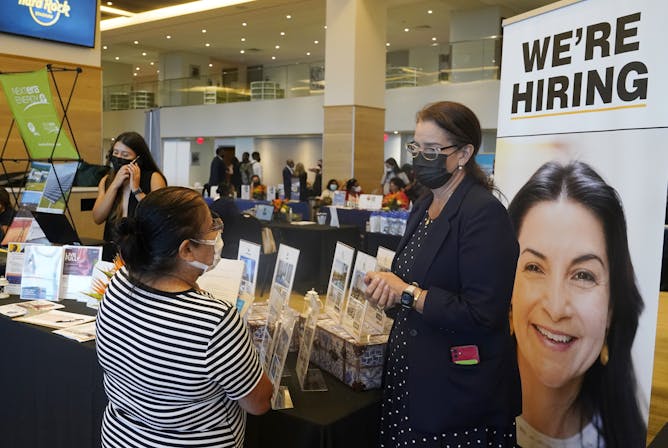|
|
|
|
Workers are quitting their jobs at record rates. Over 4.4 million people voluntarily left their jobs in September, bringing the five-month total to 20.2 million – or nearly 14% of the U.S. nonfarm labor force. The big question on everyone’s minds is why.
While COVID-19 may have exacerbated this trend with some employees possibly fearful of getting infected on the job, it began long before the pandemic began – and will likely continue long after it ends, writes Ian Williamson, a scholar of human resource management at the University of California, Irvine. Employers may have to just get used to it, and Williamson has suggestions as to how.
Also today:
One note: If you believe it is important for people across the United States to be able to read journalism like this at no charge, we hope you will support our work with a donation in our end-of-year fundraising campaign, which starts today. We need civic-minded individuals like yourself to underwrite our efforts to bring the knowledge of experts to the public.
Thank you in advance for your generosity.
|

|
Bryan Keogh
Senior Editor, Economy + Business
|
|

Employers are having a harder time recruiting new workers.
AP Photo/Marta Lavandier
Ian O. Williamson, University of California, Irvine
A record share of workers quit their jobs in September. A human resources scholar explains how this is a trend that predates the pandemic.
|
Environment + Energy
|
-
Christina E. Hoicka, University of Victoria; Daniel Sperling, University of California, Davis; Ian Lowe, Griffith University; Kate Dooley, The University of Melbourne; Kyla Tienhaara, Queen's University, Ontario; Mariola Acosta Francés, International Institute of Tropical Agriculture (IITA); Mark Maslin, UCL; Piers Forster, University of Leeds; Ran Boydell, Heriot-Watt University; Simon Lewis, UCL
Has the summit delivered on its goals?
-
Jennifer Devine, Texas State University
More than 100 world leaders have pledged to end the destruction of forests by 2030 as a way to slow climate change. That will require changing how the world produces four widely used commodities.
|
|
Politics + Society
|
-
Jennifer Selin, University of Missouri-Columbia
Donald Trump asked former aides not to testify before a committee investigating the Jan. 6 Capitol insurrection. The Department of Justice has now charged one over that refusal.
|
|
Education
|
-
Jamaal Abdul-Alim, The Conversation; Alvin Buyinza, The Conversation
In recognition of National Hip Hop History Month, The Conversation presents four articles that deal with how educators and rappers are taking hip-hop from concerts to classrooms.
|
|
Arts + Culture
|
-
Andrew M. McClellan, San Diego State University
Epic poetry tends to be seen as highbrow, while action films are regarded as puerile and brutish. But the two share an affinity for dressing up brutal deaths with rhetorical flair.
|
|
Health
|
-
Ismaeel Yunusa, University of South Carolina
World Diabetes Day on Nov. 14 marks an increase in diabetes deaths and new diagnoses as the COVID-19 pandemic continues to hinder care for chronic conditions.
|
|
Ethics + Religion
|
-
Iqbal Akhtar, Florida International University
Zakat, or charity, is a fundamental practice within the Islamic faith.
|
|
Science + Technology
|
-
K. Hazel Kwon, Arizona State University
Disinformation is being privatized around the world. This new industry is built on a dangerous combination of cheap labor, high-tech algorithms and emotional national narratives.
-
Chris Impey, University of Arizona
The fastest things ever made by humans are spacecraft, and the fastest spacecraft reached 330,000 mph – only 0.05% the speed of light. But there are ways to go faster.
|
|
Trending on site
|
-
Celine-Marie Pascale, American University
Millions of Americans struggle to pay their bills each month, despite earning wages well above the federal poverty line and holding multiple jobs.
-
Steve Calandrillo, University of Washington
Washington, California and Florida are mulling a permanent switch to DST. Proponents say that doing so could improve health, save energy and prevent crime.
-
Nathaniel Hafer, UMass Chan Medical School
The two types of COVID-19 tests – antigen and PCR – work in very different ways, which is why one is fast but less accurate and the other is slow and precise.
|
|
Reader Comments 💬
|
-
"We need a social media temperance movement, although of a more effective nature than the last temperance movement this country saw, resulting in a constitutional amendment and its interesting aftermath. However, when I see six-year-olds sitting at their school desks gazing at their screens, when I see parents diverting their two-year-olds with their phones while shopping, etc., I despair that such a movement will arise."
– Reader John Platt on the story 3 ways Congress could hold Facebook accountable for its actions
|
|
| |
| |
| |
| |
| |
| |
|
|
|
|
|
|
|